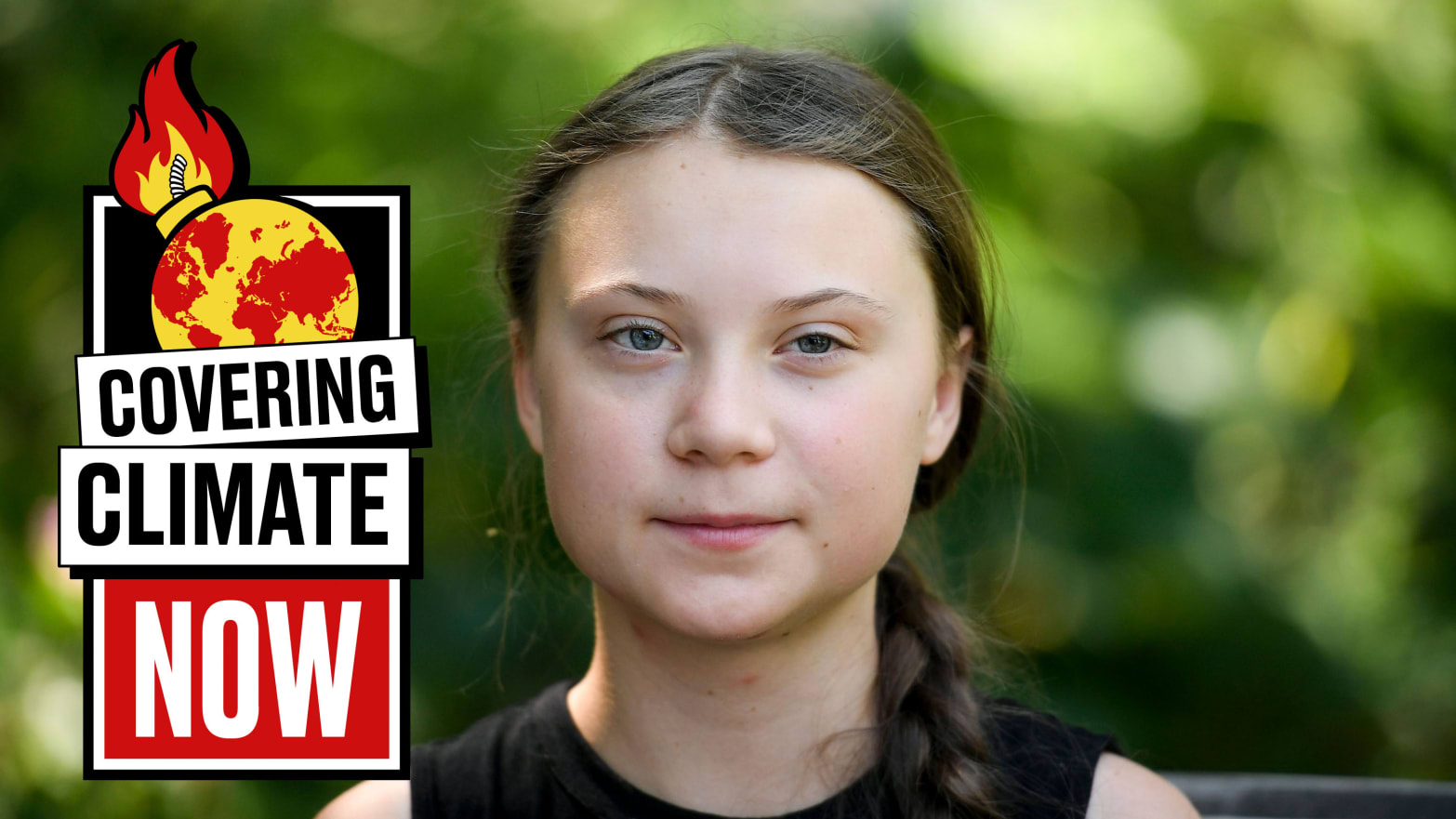This story is part of Covering Climate Now, a global collaboration of more than 220 news outlets to strengthen coverage of the climate story.
ROME–When Swedish climate change activist Greta Thunberg was 11 years old, her body had started to shut down due to severe self-starvation tied to debilitating depression. She spoke to almost no one but her immediate family. She was afraid of crowds. She was lost in her own world, and the world very nearly lost her.
But thanks to the formal diagnosis of Asperger’s syndrome coupled with high-functioning autism and obsessive compulsive disorder, the now-16-year-old Swede has become quite literally the poster child for the generation that will have to deal with the destruction of our planet. Once she started receiving multifaceted treatment, Thunberg was able to channel her anxiety into something we should all be concerned about: the health of the planet and the science behind apocalyptic warnings of its demise.
In October 2018, Thunberg started having anxiety-ridden 3 a.m. nightmares, but unlike before, they were not about her. The recurring nightmares were about the impact of global warming on the planet, according to the book, Scenes From the Heart, she wrote with her parents and sister Beata, who also suffers from many of the same emotional conditions.
This time, instead of holing up in her bedroom as she did before treatment, she decided that her anxiety about the climate needed to become everyone else's, too. One of the aspects of her complicated diagnosis is obsession. Her family says she just wouldn't let the idea go that the planet was burning up and there was ample science to prove it. She did not understand why no one was doing anything. She could not comprehend why adults and policy makers were ignoring the issue.
She started skipping school on Fridays to protest, all alone, on the steps of the Swedish Parliament in Stockholm where she grew up. Slowly–and in some ways inexplicably—the protests, which were dubbed Fridays for Future, caught on and soon she was joined by tens, then scores, then hundreds of Swedish children demanding that adults start paying attention to science when it comes to climate change.
Soon, the girl who once would not leave her bedroom was traveling across Europe to draw her peers out of the classrooms and onto the streets for the sake of the environment. Since she began not even a year ago, the protests have been held in 100 cities by teen activists. Her intensity has become her secret weapon and her now-famous speeches at the World Economic Forum’s annual meeting in Davos, in front of the British Parliament and at the United Nations’ COP24 Climate Talks, landed her a nomination for the Nobel Peace Prize this year.
“You have ignored us in the past, and you will ignore us again,” she told the World Economic Forum in Davos. “You say you love your children above all else, and yet you are stealing their future in front of their very eyes.”
“Those who will be affected the hardest are already suffering the consequences,” she scolded the British Parliament. “But their voices are not heard. Is my microphone on? Can you hear me?”
When she was invited to speak at the United Nations Climate Action Summit in New York to be held later this month, she was faced with a dilemma. Would she look like a hypocrite hopping on a jet, leaving the very carbon footprint she had won such acclaim railing against? Instead, she took a state-of-the art carbon-zero yacht called the Malizia II, and made the journey by sea.
The Malizia II is owned by German property developer Gerhard Senft. It was built as a high-tech racing craft that was designed to collect data for scientists studying rates of ocean acidification from carbon emissions. Senft offered use of the boat and crew when he heard Thunberg wanted to sail across the Atlantic to address the climate summit.
In the 14 days at sea, some of them in inclement weather, the crew didn't turn on the motor once. The Malizia II crew was led by Pierre Casiraghi, who happens to be the grandson of Monaco’s Prince Rainier III and actress Grace Kelly. The yacht is kitted out with solar panels and hydro generators, meaning it is completely emission-free. But its spare design doesn't have a functioning toilet, shower or other amenities.
Not everyone wants to hear Thunberg’s message and there is a growing chorus of people who say she and her obsessive condition are being exploited for political purposes. Thunberg has been the object of cruel attacks from climate change deniers who have used her medical conditions against her. Arron Banks, a prominent British businessman who bankrolled the drive for Brexit, tweeted, “Freak yachting accidents do happen in August.” He later said the tweet was a joke, but he has not removed it from his feed. Far-right groups across Europe have chided her and her message, referring to the "apocalyptic dread in her eyes” and saying many other things far too cruel to repeat.
There is an argument to be made that climate deniers tend to be men and climate activists, with the exception of Al Gore, tend to be women, sparking debate whether there is a misogynistic element to the debate. A 2016 study in the Journal of Consumer Research,“Is Eco-Friendly Unmanly? The Green-Feminine Stereotype and Its Effect on Sustainable Consumption,” backs up the theory. “Men may shun eco-friendly behavior because of what it conveys about their masculinity,” the authors write. “It’s not that men don’t care about the environment. But they also tend to want to feel macho, and they worry that eco-friendly behaviors might brand them as feminine.”
Thunberg’s most vocal critics, it has to be said, are all men, but many of them actually go beyond misogyny and come very close to shaming her for her Asperger’s.
Steve Milloy, a former Trump staffer and full-time Thunberg obsessive, regularly tweets about the “climate puppet.” He claims that the “the world laughs at this Greta charade,” often posting pictures of the teenager in awkward poses.
Her response has always been swift to her 1.4 million Twitter followers and 3.1 million followers on Instagram. “I am indeed ‘deeply disturbed’ about the fact that these hate and conspiracy campaigns are allowed to go on and on and on just because we children communicate and act on the science,” she tweeted in August. “Where are the adults?”
Thunberg chronicled her journey to America by sea on her social media, but after each post is a usual barrage of hate, insults and cruelty of the kind you might expect on a playground. She reads them all, often commenting, but most often questioning why people just don't want to see the truth.
When she neared Manhattan in late August after two weeks on the high seas, she was escorted into the harbor by a fleet of 17 boats representing the U.N.’s sustainability development goals and hordes of teens who stood in the rain at 3 a.m. to cheer her to shore. Many will attend the Fridays for Future protest in New York City on September 20. Others just wanted to get a glimpse of their unlikely heroine. But one person she won’t see when she is in the U.S. is President Donald Trump. She has not been invited to meet him, but if she is, she told her supporters that she would decline because she has “nothing to say” to those who don’t believe the science.
“I usually ignore them,” she said when asked recently what she would tell a climate change denier like Trump. “I have nothing to say to them and they have nothing to say to me.”
She added that, indeed, if she did meet the president or someone “like him” she would keep going back to the science. “Many people think climate change is an opinion,” she said. “But it's not an opinion, it's a fact.”
On September 23, Thunberg will address the U.N. Climate Change Summit, quoting from her recent book No One Is Too Small to Make a Difference. She has held weekly Fridays for Future protests since her arrival in late August, inspiring hundreds of American teens to protest for policy changes. She has also inspired many of her peers to ignore the naysayers.
“When haters go after your looks and differences, it means they have nowhere left to go,” she tweeted a few hours after she docked in New York. “And then you know you’re winning! I have Aspergers and that means I’m sometimes a bit different from the norm. And - given the right circumstances- being different is a superpower.”
Indeed, in the case of this young Swedish climate-busting hero, it most certainly is.

